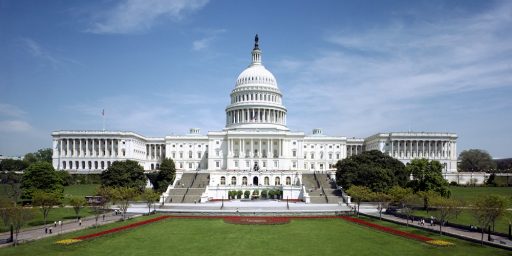Republicans and the COVID-19 Hate Crimes Act
A third of the party's Members of Congress voted against a popular bill.

Yesterday, the House passed said legislation 364-62, following the Senate, which did so 94-1 last month. President Biden signed it immediately. The controversy, though, is that, while the passage was overwhelming and bipartisan, all of the No votes came from Republicans.
Indeed, CNN yesterday afternoon published a piece titled “Here are the 63 Republicans who voted against the anti-Asian hate crimes bill” that literally just listed their names. A piece at YahooNews is titled “Republicans explain their vote against Asian American hate crimes legislation” but, alas, it’s not useful in accomplishing the titular objective, seemingly just stringing together some tweets the reporter hastily assembled.
For Hawley and his colleagues over in the House, the bill was anything but necessary.
“It’s too broad,” he said in a statement explaining his vote. “As a former prosecutor, my view is it’s dangerous to simply give the federal government open-ended authority to define a whole new class of federal hate crime incidents.”
[…]
“My big problem with Sen. Hirono’s bill … is that it turns the federal government into the speech police — gives government sweeping authority to decide what counts as offensive speech and then monitor it. Raises big free speech questions,” Hawley wrote.
Rep. Jim Jordan, R-Ohio, echoed Hawley and suggested that the spike in violence against Asian Americans was tied to efforts backed by some Democrats and other progressives to decrease funding for the police.
“This violence, by and large, is happening in Democrat-controlled cities, many of which, interestingly enough, have defunded their police departments,” Jordan said on the House floor.
Rep. Chip Roy, R-Texas, summed up the view of many GOP House lawmakers when explaining his decision to join Hawley and vote no on the bill.
“We can’t legislate away hate,” Roy told his colleagues on the House floor ahead of the vote.
The Texas congressman was joined in voting no by conservative firebrands Reps. Matt Gaetz of Florida, Lauren Boebert of Colorado, Mo Brooks of Alabama and Marjorie Taylor Greene of Georgia.
So, Jordan and Roy are morons and the rest are rabid ideologues. But I’m actually sympathetic to Hawley’s concerns about overreach. Mostly, though, it just strikes me as unnecessary. A CNN report describes it thusly:
The bill would create a new position at the Justice Department to expedite review of potential Covid-19-related hate crimes and incidents reported at the federal, state or local level.
It would also direct the departments of Justice and Health and Human Services to work with community-based organizations to issue guidance raising awareness of hate crimes during the pandemic, and would require the US Attorney General to issue guidance to work with state and local law enforcement agencies to establish online reporting of them.
“The Covid-19 Hate Crimes Act will strengthen our defenses to prevent and combat anti-AAPI violence and will build on steps already taken by President Biden. Together these actions will make a significant difference in how we address hate crimes in America, not only during this pandemic, but for years to come,” House Speaker Nancy Pelosi said on Tuesday.
While it’s certainly debatable whether there is a radical increase in anti-Asian violence in the wake of former President Trump and other’s attempts to blame the pandemic on China, it’s certainly reasonable for political leaders to take a stance against it. But do we literally need to make a federal case out of it? What is the evidence that state and local authorities can’t or won’t handle the situation?
I’m generally skeptical of the whole “hate crimes” category because it has tremendous potential for abuse. Still, we have a history in this country of crimes against Blacks being ignored by local authorities, requiring federal intervention on a Civil Rights Act basis. Ditto anti-LGBTQ violence. So far as I’m aware, though, this hasn’t been an issue with Asians and Pacific Islanders in a long, long time.
So, why do we need to expedite review of these cases at the federal level? Did we really need new legislation to empower community groups to “raise awareness” of, well, anything? Could the FBI, which does most of our collecting of crime statistics, not issue reporting guidance before now?
Again, two-thirds of Republicans—including all but one Senate Republican—voted for the bill. Even in the House, the entire GOP leadership voted in favor. I wish those who voted against did a better job of articulating their reasons.


![House Leadership Crisis Continues [Updated]](https://otb.cachefly.net/wp-content/uploads/2023/10/jim-jordan-weirdo-512x256.webp)



Hawley’s concern about providing police with more discretionary power that they can abuse, while legitimate, it is also laughable coming from him.
Anecdotally hate crimes against Asians has increased over the last year, whether this is simply more complete news coverage, is an unanswered question. If the increase is real or simply Asian’s appearing people are reporting more incidents to the police than in the past, the hate crimes designation is justified.
The R fear is that it will be used against whites, but they should be assured that it will more likely be used by offenders that are black or Hispanic.
Define “too broad”, Senator. Do you possibly mean “affects you and you don’t think it should”? This is the same objection to red flag laws or gun control – they are cognizant they qualify but don’t think they’re that bad. They don’t want to accept how widespread a problem is and so only the most blatant negative manifestations of the issue count.
If you keep running afoul of the definition of hate crime, maybe you should stop and ask yourself why. I’ve said it before – people who are the Assistant Manager to Evil never think of themselves as Evil per se because they aren’t bad. Hate crime laws apply to bad people and if they may now qualify for what they think of harmless or normal behavior, it’s “too far” in their eyes. Motivation for a crime matters and it’s how we determine severity and classification. The guy that mugs and beats you just for money may not have singled you out but the guy that targeted you specifically for who you are has gone farther into malicious intent. True, you can’t legislate away hate but you can add deterrence to intentional targeting and make it not worth it to some angry nut. The difference between a couple of days in county lockup and years in prison might be enough to stay someone’s hand or get a violent soul off the streets and save a life.
My first law job was as a clerk to a federal trial court judge. For non-lawyers, the federal court system and the state court systems are pretty different, both in terms of the procedures and in terms of the areas of law the judges and staffs tend to see and be familiar with.
Back in the ’80s when I was there, we had RICO claims and a few other “federal” crimes that brought was mostly state court litigation – civil fraud in the case of RICO – into federal court. Diversity jurisdiction always brings some amount of state court work into federal court. I am not at all sure that federal courts bring much to the table that state courts don’t and I am sure that federal judges frequently know far less about the substance of the relevant law.
For this reason, I am always suspicious of federalizing certain crimes and actions, primarily so that the federal Congress can take credit for having addressed it. If crime is up against AAIP folks, it should be addressed both individually and as a demographic trend. I have no confidence that adding a federal element will materially improve this.
@KM: I honestly cannot imagine the individual who would beat up or shoot random AAPI individuals now but will be deterred upon learning that there are now federal resources available.
Maybe a quick edit of the title? I read the post out of curiosity as to what the heck a COVID hate crime might be.
I tend to sympathize with a feeling that such legislation is over broad and really just a feel good resolution. On the other hand, opposition by Jordan, Boebert, Gaetz, et al is a pretty good argument for it.
I have a sense that a lot of anti-Asian crime is by Black perpetrators. If true then the target is less white people than Black people. Had this been patiently explained to Josh Hawley he’d have quickly supported the law.
I view the various laws that have been leveled against crimes based on racial or other targets of prejudice
Contrary to claims by conservatives, these laws don’t criminalize thoughts. You can’t be prosecuted for what you are thinking. There has to be an underlying criminal offense that was motivated by prejudice. In the end a hate crimes law represents a societal determination that crimes motivated by hate should be punished with an enhanced sentence if they are convicted
@Michael Reynolds: I have no idea if that is true now, or nationally, but NYC in the 90s had Blacks’ racism towards Asians (and vice versa) on full display. I wouldn’t doubt if this was continuing now, and had been riled up by Trump.
(In a way, it was almost reassuring that Blacks in NYC then were so racist — it showed that we’re all the same inside, where it counts. Just, you know, in a bad way.)
@Gustopher:
Yes, it appears racism, like all forms of evil, is a human failing, not a failing limited to one group or another. Much like stupidity, which is appears to be mostly male until women get the chance to break that glass ceiling at which point they prove themselves every bit as stupid.
@Doug Mataconis:
And that can–and should–be reflected in the sentencing. We already do that with crimes that aren’t covered by hate crime laws.
My “issue” (I guess I’d call it) is that I see no difference in someone who is brutally murdered because of their skin color than someone who is brutally murdered because they’re Catholic or a Cubs fan.
@Mu Yixiao:
Point taken. I would say that the hate crime laws, reflect the view of a majority of society that certain races, ethnic groups are particularly burdened by group hatred. At a different time in our history the same could be said of Catholics, the Irish, Italians and Poles, but those times have passed and the animus that those groups faced had faded.
As far as a Cubs, fan’s death, Cardinal’s fans may feel that the perp deserves a medal.
@James Joyner:
Much as during the civil rights era, the federal resources can be a significant deterrent if there is a de facto policy of apathy toward the problem at the state level.
@Sleeping Dog:
The thing is, hate crimes against Catholics or even against “whites” are included in most hate crime legislation–it’s just that such crimes aren’t especially common compared with those against people of color, Jews, Muslims, LGBT, etc.
Long time ago, maybe early 90s, at a BBS board (remember them? They preceded internet message boards), discussion on when it’s permissible to shoot someone breaking into one’s home morphed into which kinds of people could be denied service at a business open to the public.
I don’t recall the arguments, but there was a sizable contingent who claimed various minority groups, of all kinds, did not in essence have the same rights as white, Christian citizens.
It’s a very old story, which I’m sure goes much further back.
If we ever did, what would Republicans do? (low hanging fruit here guys)
@Sleeping Dog: Well, not given a medal but certainly it should be considered an extenuating circumstance. 😉
@James Joyner: I don’t see deterrence as the point. We have extra penalties if you assault a cop, or a pregnant woman, or flourish a gun during a crime, or about a thousand other things. We provide harsher penalties because we see these things as especially corrosive to our society.
@Mu Yixiao:
Right. As I said above, We provide harsher penalties for certain crimes because we, as a society, have deemed them worse than other similar crimes because of their effects on society, and because we have passed laws that designate those harsher penalties.
@Stormy Dragon: What you said. The point of federalizing a crime is often a history of lax prosecution on the states part.
@KM:
Ha. Last night, I saw a screenshot of a Tweet that was probably from 2016. It said:
@MarkedMan:
Tying in with your next comment, we have passed the laws because we want to take some discretion away from the judges, because we have a history of judges giving lighter sentences.
@Mu Yixiao:
I believe religion, as an acknowledged protected class, is covered under most hate-crime statutes.
Cubs far, however, likely is not.
With immigration and refugee status (which I know of second or third hand, as I have a friend who helps translate for an organization that helps people file claims to stay in this country), the key is often to try to show that the person fleeing was targeted because of their membership in a distinct group rather than something they themselves did — where distinct group can be racial, religious, political, etc., and is purposefully left ill-defined.
That seems like a better model than deciding “and today we shall pass federal hate-crime legislation for Asians, tune in tomorrow for Quebecois (or not)”. Ultimately, if we do have someone attacking people because they are Cubs fans, and the prosecution can show that, we want that violent moron in jail for a long, long time.
Although, we should have a specific carve out for Nazis. Punching Nazis should always be ok.
@Stormy Dragon:
As in so many of your comments on my posts, I explicitly explored this issue in the OP. I simply don’t see any evidence that there has been a recent (say, post-1960) tendency to underprosecute or undercharge crimes against AAPI individuals.
@Gustopher:
According to Wikipedia, many states include categories for hate crime legislation well beyond the standard ones that get the most attention (usually at the federal level). For example, three states include homelessness as a category; several include political affiliation; DC includes marital status and “personal appearance.”
@Gustopher:
I point you to the mandatory minimums in the “war on drugs”. ’nuff said.
@Kylopod:
The prosecution rests.
When “personal appearance” is qualified as a “hate crime”, then anything can be. It’s nothing more than “we want an excuse to punish someone more severely because we don’t like them*.”
I have a problem separating “We can punish you more for hurting people we like” and “We won’t punish you as much if you hurt people we don’t like”.
And yes… I fully understand that “hate crimes” are a serious issue. I simply don’t trust Congress to come up with the solution. They’re not looking for solutions, they’re looking for sound bytes and feathers in their caps.
===========
* Trigger warning! Singular them used. 😛
No cities have defunded their police departments. I believe the House has a rule forbidding members from calling each other liars. It’s time for another rule prohibiting deliberate lying, with penalties for breaches.